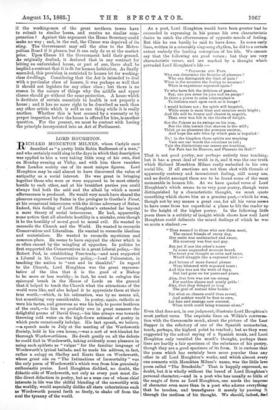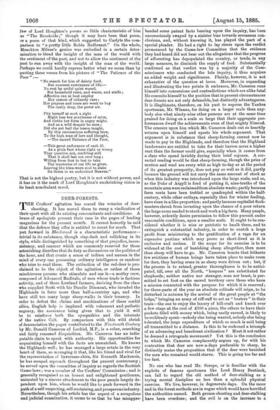LORD HOUGHTON.
RICHARD MONCKTON MILNES, whom Carlyle once described as "a pretty little Robin Redbreast of a man," and who certainly could sing in the days in which that description was applied to him a very taking little song of his own, died on Monday evening at Vichy, and with him there vanishes from London society one of its most unique figures. Lord Houghton may be said almost to have discovered the value of antipathy as a social interest. He was great in bringing together those who were or were supposed to be most utterly hostile to each other, and at his breakfast parties you could always find both the acid and the alkali by which a moral effervescence is produced. He would very much have shared the pleasure expressed by Satan in the prologue to Goethe's Faust, at his occasional intercourse with the divine adversary of Satan. Indeed, this feeling of Lord Houghton's extended far beyond a mere theory of social intercourse. He had, apparently, some notion that all absolute hostility is a mistake, even though it be the hostility of moral good to moral evil. He wanted to reconcile the Church and the World. He wanted to reconcile Conservatism and Liberalism. He wanted to reconcile idealism and materialism. He wanted to reconcile mysticism and common-place. He seems to have enjoyed the shiver which is so often caused by the mingling of opposites. In politics he first supported the Conservatives in a great Liberal policy,—Sir Robert Peel, in establishing Free-trade,—and next supported a Liberal in his Conservative policy,—Lord Palmerston, in teaching the nation to "rest and be thankful." In regard to the Church, Lord Houghton was the great represen- tative of the idea that it is the good of a Bishop to be more or less worldly; in fact, he used to eulogise the episcopal bench in the House of Lords on the ground that it helped to teach the Church what the attractions of the world were like, and also helped it to appreciate them at their true wortb,—which, in his estimation, was by no means nil, but something very considerable. In poetry, again, catholic as were his tastes, and generous as was his help to poorer brethren of the craft,—to him we probably owe in great measure the delightful poems of David Gray,—his bias always was towards throwing cold water on the high-flown estimate of poetry in which poets occasionally indulge. His last speech, we believe, —a speech made in July at the meeting of the Wordsworth Society, held in his own house,—was a sort of wet-blanket for thorough Wordsworthians. He dwelt gently on all the defects he could find in Wordsworth, taking evidently some pleasure in using such epithets as " vulgar " for the familiar language of Wordsworth's lyrical ballads, and he made his address, in fact, rather a eulogy on Shelley and Keats than on Wordsworth, whose great ode on " The Intimations of Immortality " was the only poem of Wordsworth's which won from him genuinely enthusiastic praise. Lord Houghton disliked, no doubt, the didactic side of Wordsworth, not only as every poet must dis- hire direct didactism in poetry, but as a man one of whose chief interests in life was the skilful blending of the unworldly with the worldly, would especially dislike all stern exhortations such• as Wordsworth poured forth so freely, to shake off from the soul the tyranny of the world.
As a poet, Lord Houghton would have been greater had he succeeded in expressing in his poems his own characteristic desire to catch the effervescence of opposite moods of feeling.
But this he can hardly be said to have done. In some early lines, written in a miserably sing-song rhythm, he did to a eertais extent embody the leading conception of his life. We cannot say that the following are good verses ; but they are very characteristic verses, and are marked by a. thought which pervaded Lord Houghton's life :—
" PLEASURE AND PAIN.
Who can determine the frontier of pleasure ? Who can distinguish the limit of pain ?
When is the moment the feeling to measure ? When is experience repeated again ?
Ye who have felt the delirium of passion, Say, can you sever its joys and iba pangs ? Is there a power in calm contemplation To indicate each upon each as it hangs ?
I would believe not ; for spirit will languish, While sense is most blest and creation most bright; And life will be dearer and clearer in anguish, Than ever was felt in the throbs of delight.
See the Fakeer as he swings on his iron, See the thin hermit that starves in the wild; Think ye no pleasures the penance environ, And hope the sole bliss by which pain is beguiled ?
No ! in the kingdom these spirits are reaching Vain are our words the emotions to tell ; Vain the distinctions our senses are teaching, For Pain has its Heaven, and Pleasure its Hell!"
That is not good poetry, nor perhaps entirely true teaching, but it has a great deal of truth in it, and it was the one truth which Richard Monckton Milnes really embodied in his own social life. If all emotions are not thus shot with threads of apparently contrary and inconsistent feeling, still many are, and no doubt amongst them are to be found some of the most memorable in human life. As we have quoted verse of Lord Houghton's which seems to us very poor poetry, though verse distinguished by a characteristic thought, we must quote something which shows him as a genuine poet,—which he was, though not by any means a great one, for all his verse seems to have come from too superficial a plane to lift the reader up to the height of the higher poetry. In the following little poem there is a subtlety of insight which shows how well Lord Houghton could delineate the mixed feelings of which he was so acute a student :-
"They seemed to those who saw them meet,
The casual friends of every day, Her smile was undisturbed and sweet, His courtesy was free and gay.
But yet if one the other's name In some unguarded moment heard,
The heart you thought so calm and tame, Would struggle like a captured bird ;- And letters of mere formal phrase
Were blistered with repeated tears ; And this was not the work of days, But had gone on for years and years.
Alas, that love was not too strong For maiden shame and manly pride ! Alas, that they delayed so long The goal of mutual bliss beside !
Yet what no chance could then reveal, And neither would be first to own, Let fate and courage now conceal, When truth could bring remorse alone."
Even that does not, in our judgment, illustrate Lord Houghton's most perfect verse. The exquisite lines on Wilkie's conversa- tion with the Geronomite monk, about the picture of the Last Supper in the refectory of one of the Spanish monasteries, touch, perhaps, the highest point he reached ; but as, they were suggested by the actual saying of a Spanish monk, and Lord Houghton only versified the monk's thought, perhaps these lines are hardly a fair specimen of the substance of his poetry, though they are a good specimen of its form. It is curious that the poem which has certainly been more popular than any other in all Lord Houghton's works, and which almost every one connects with Mouckten. Milnes's name, was the little lave poem called " The Brookside.' That is happily expressed, no doubt, but it is wholly without the brand of Lord Houghton's personal character,—and in a poet who has usually so littls of the magic of form. as Lord Houghton, one needs the impress of character even more than in a poet who adorns everything that he touches, and transfigures it merely by passing it through the medium of his thought. We should, indeed„ foal few of Lord Houghton's poems so little characteristic of him as "The Brookside ;" though it may have been that poem, or a poem of that kind, which suggested to Carlyle the com- parison to "a pretty little Robin Redbreast." On the whole, Monckton Milnes's genius was embodied in a certain deter- mination to blend the insight of the man of the world with the sentiment of the poet, and not to allow the sentiment of the lioet to run away with the insight of the man of the world.
Perhaps we could hardly express better what we mean than by quoting these verses from his picture of " The Patience of the Poor "
"No search for him of dainty food,
But coarsest sustenance of life,—
No rest by artful quiet wooed, But household cries, and wants, and strife ; Affection can at best employ Her utmost of unhandy care; Her prayers and tears are weak to bay The costly drug, the purer air.
Pity herself at such a sight Might lose her gentleness of mien, mud clothe her form in angry might, And as a wild despair be seen ; 'Did she not hail the lesson taught, By this unconscious suffering boor, To the high sons of lore and thought, —The sacred Patience of the Poor, —This great endurance of each ill, As a plain fact whose right or wrong They question not, confiding still That it shall last not over long ; Willing from first to last to take The mysteries of our life as given, Leaving the time-worn soul to slake Its thirst in an undoubted Heaven."
That is not the highest poetry, but it is not without power, and it has on it the mark of Lord Houghton's unshrinking vision in its least nonchalant mood.



































 Previous page
Previous page